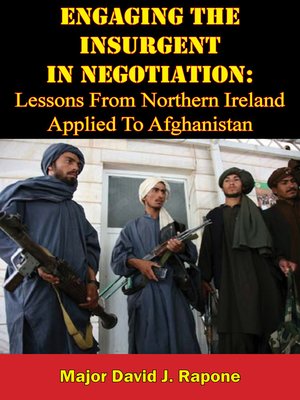Engaging the Insurgent In Negotiation
ebook ∣ Lessons From Northern Ireland Applied To Afghanistan
By Major David J. Rapone

Sign up to save your library
With an OverDrive account, you can save your favorite libraries for at-a-glance information about availability. Find out more about OverDrive accounts.
Find this title in Libby, the library reading app by OverDrive.



Search for a digital library with this title
Title found at these libraries:
| Library Name | Distance |
|---|---|
| Loading... |
Outreach, negotiation and cooption may be a vital tool for counterinsurgencies as they transform conflict and facilitate Amnesty, Reconciliation and Reintegration (AR2) of warring elements within a war-torn society. This monograph utilizes a two-system comparison between the Taliban and the Irish Republican Army (IRA) to inquire if the Taliban are willing to participate in fruitful dialogue to initiate AR2. The suggestion for adopting a Northern Ireland approach for negotiation is compelling due to the strategic similarities the Taliban and the IRA share. The similarities, however, are the underlying reason why the Taliban will not be amenable to compromise within the short-term context compelled by the United States current strategy. What emerged is that the Taliban is reacting to changing environmental stimuli in the same manner as the PIRA. The direct consequence of this similarity is the likelihood of negotiations and outreach to take hold. The Taliban in 2010, like their IRA counterparts in 1972, believe they have a comparative advantage over their counterparts and are not willing to compromise their ideological convictions. Thus, policy makers in Washington, London, and Kabul should cool their rhetoric surrounding negotiation and dampen expectations that talks with the Taliban will yield significant results.







